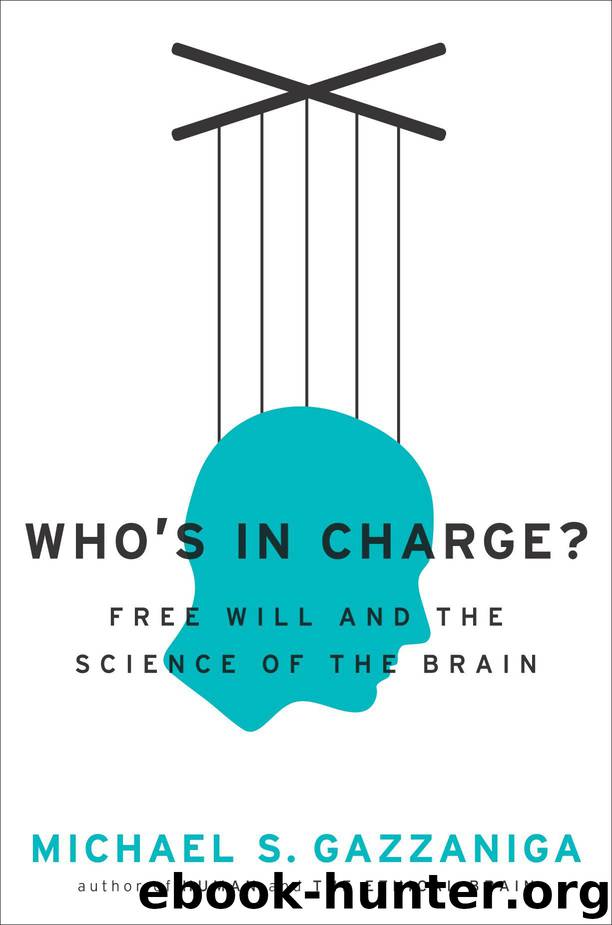Who's in Charge?: Free Will and the Science of the Brain by Gazzaniga Michael S

Author:Gazzaniga, Michael S. [Gazzaniga, Michael S.]
Language: eng
Format: mobi, epub
Publisher: Harper Collins, Inc.
Published: 2011-11-14T16:00:00+00:00
How to Rile a Neuroscientist
Modern neuroscience is happy to accept that human behavior is the product of a probabilistically determined system, which is guided by experience. But how is that experience doing the guiding? If the brain is a decision-making device and is gathering information to inform those decisions, then can a mental state that is the result of some experience or the result of some social interaction affect or constrain future mental states? If we all were French we would, in exasperation, jut out our upper lip and let out an expiration, shrug, and say, “but of course,” unless you were a neuroscientist or perhaps a philosopher. This means top-down causation. Suggesting top-down causation to a group of neuroscientists are fightin’ words. It is to your peril to invite a group of them to your house and bring it up at dinner. Better we invite the physicist Mario Bunge, who will tell us that we “should supplement every bottom-up analysis with a top-down analysis, because the whole constrains the parts: just think of the strains in a component of a metallic structure, or the stress in a member of a social system, by virtue of their interactions with other constituents of the same system.”
If we invite our systems control expert, Howard Pattee, he will be happy to tell us that while causation has no explanatory value at the level of physical laws, it certainly does at higher levels of organization. For instance, it is helpful to know that iron deficiency causes anemia. Pattee suggests that the everyday meaning of causation is pragmatic and is used for events that are controllable. Controlling the iron level will fix the anemia. We cannot change the laws of physics, but we can change the iron level. When a car rear-ends another car at the bottom of a hill, we say that the accident was caused by the worn-out brakes, something we can point our finger at and control. We do not, however, blame the laws of physics or all the chance circumstances that are not under our control (the fact that there was another car stopped at the light at the bottom of the hill, all the reasons that led to that driver being there, the timing of the traffic lights, and so on). Pattee sees this tendency to identify a single controllable cause “that, by itself, might have prevented the accident but maintained all other expected outcomes,” rather than as the result of a complex system as “one reason that downward causation is problematic. In other words, we think of causes in terms of the simplest proximal control structures in what would otherwise turn into an endless chain or network of concurrent, distributed causes.” That is to say, downward causation is chaotic and unpredictable.
And where does control enter into the picture, Pattee asks? Not at the micro level, because by definition physical laws describe only those relations between events which don’t vary from one observer to the next. When a parent sternly
Download
Who's in Charge?: Free Will and the Science of the Brain by Gazzaniga Michael S.epub
This site does not store any files on its server. We only index and link to content provided by other sites. Please contact the content providers to delete copyright contents if any and email us, we'll remove relevant links or contents immediately.
The remains of the day by Kazuo Ishiguro(8981)
Tools of Titans by Timothy Ferriss(8369)
Giovanni's Room by James Baldwin(7330)
The Black Swan by Nassim Nicholas Taleb(7111)
Inner Engineering: A Yogi's Guide to Joy by Sadhguru(6785)
The Way of Zen by Alan W. Watts(6601)
Asking the Right Questions: A Guide to Critical Thinking by M. Neil Browne & Stuart M. Keeley(5762)
The Power of Now: A Guide to Spiritual Enlightenment by Eckhart Tolle(5760)
The Six Wives Of Henry VIII (WOMEN IN HISTORY) by Fraser Antonia(5505)
Astrophysics for People in a Hurry by Neil DeGrasse Tyson(5182)
Housekeeping by Marilynne Robinson(4436)
12 Rules for Life by Jordan B. Peterson(4299)
Double Down (Diary of a Wimpy Kid Book 11) by Jeff Kinney(4261)
Ikigai by Héctor García & Francesc Miralles(4247)
The Ethical Slut by Janet W. Hardy(4243)
Skin in the Game by Nassim Nicholas Taleb(4240)
The Art of Happiness by The Dalai Lama(4125)
Skin in the Game: Hidden Asymmetries in Daily Life by Nassim Nicholas Taleb(3993)
Walking by Henry David Thoreau(3953)
